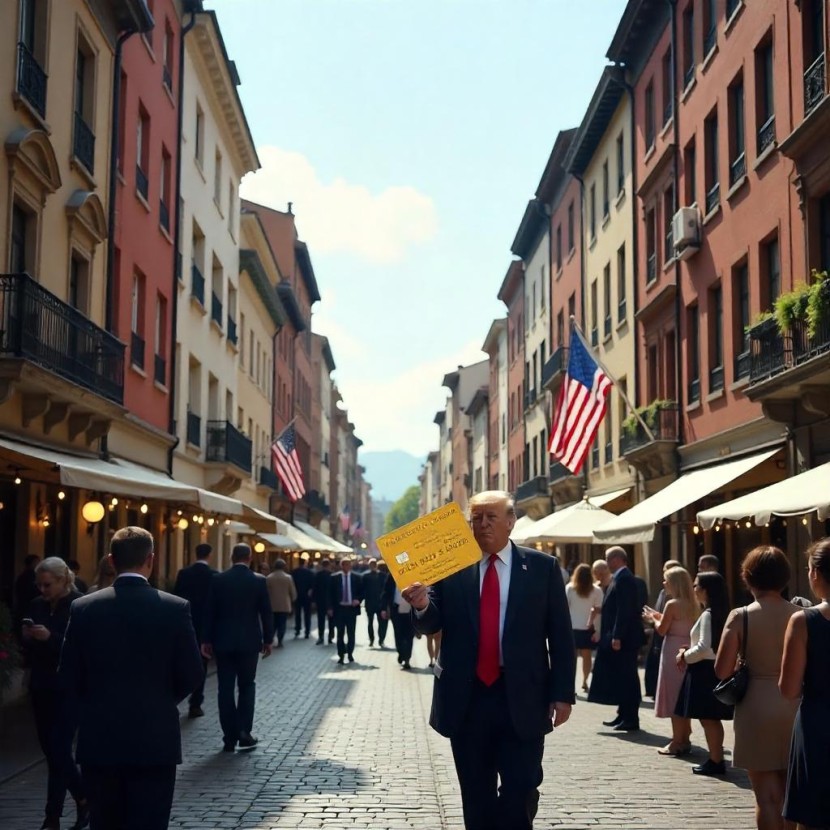Thursday, June 26, 2025

In a major change to U.S. immigration policy, former President Donald Trump has introduced a high-end visa program dubbed the Gold Card (also referred to as the “Trump Card”), a USD 5 million residency permit aimed at attracting affluent, entrepreneurial foreigners—especially Indian graduates and investors—with an accelerated pathway to U.S. citizenship.
A New Era in Investor Visas
The proposed Gold Card replaces the long-standing EB‑5 investor visa. The EB‑5 traditionally required investments of $800,000 to $1.05 million and mandated the creation of at least ten full‑time U.S. jobs Under the new scheme, applicants would invest $5 million directly—effectively a “premium green card”—but would no longer be bound by the job creation requirement
Trump reinforced the shift during a February 25 announcement, calling it a “beautiful road to gaining access to the greatest country and market in the world,” with unspecified “plus” benefits over the existing green‑card system. Commerce Secretary Howard Lutnick echoed this vision, suggesting the program could generate enormous national revenue and attract “world‑class global citizens”
Waiting List Kicks Off
On June 12, Trump launched the official website, TrumpCard.gov, opening a waiting list for high‑net‑worth applicants Early interest surged: by mid‑June, over 69,000 individuals had registered, and signs pointed to potential demand reaching the hundreds of thousands. Lutnick hinted that 200,000 signups could bring $1 trillion in revenue, helping pay down national debt.
Unlike EB‑5 wait times, this card promises a more direct route—eliminating project uncertainties and job-creation requirements. It also proposes lower oversight, potentially expediting approval.
Tax Advantage: A Game Changer
A key selling point: Gold Card holders would not pay federal income tax on non-U.S. earnings, a radical departure from current law. Trump himself stated at one point that “they won’t have to pay tax from where they came” . However, compliance details remain murky: such tax exemptions typically require congressional amendment to the tax code, and it’s unclear how state and estate taxes would apply .
Impact on Indian Graduates and Entrepreneurs
India—already a top exporter of international students—stands to gain significantly. Thousands of Indian graduates in STEM, engineering, and business fields face visa-related uncertainty post-graduation. The Gold Card offers a direct route to work and residency without relying on employer-sponsored H‑1B visas .
Moreover, high-net-worth Indians could tap the scheme to scale up or establish U.S. ventures. With the removal of job-creation mandates, the process becomes more straightforward—though still expensive.
Bigger Picture: Economy, Security, and Precedents
Trump frames the card as a tool to boost foreign capital, entrepreneurship, and tax income. Lutnick emphasized that wealthy, vetted individuals would “bring businesses and opportunity to America” . This “market‑driven” visa mirrors “golden visas” adopted and then curbed by countries like Portugal, Greece, and the UK .
But the program is already drawing scrutiny. Critics question its legality without Congressional approval, as only legislation can amend immigration law and tax provisions. Immigration experts stress that replacing EB‑5 is far from achievable through executive action alone.
Security concerns echo past controversies in Europe, where golden-visa programs were scaled back amid housing, money-laundering, and national-security alarms.
Political and Cultural Reactions
Domestically, critics have questioned the principle of “selling citizenship.” Late-night comedians lampooned the announcement: Jimmy Kimmel compared it to a Mar‑a‑Lago loyalty “casino points” program, and Stephen Colbert called it “a cover charge for America”.
On Capitol Hill, some lawmakers voiced alarm. Representative Ro Khanna sharply criticized the scheme as short-sighted and inequitable . Meanwhile, Trump’s broader policy agenda, including this visa reform, underscored growing partisan divisions.
What Comes Next?
At this stage, the Gold Card is a proposal in development. Key details are still pending:
- Legislation needed: Despite Trump’s assertion, Congress must enact new laws to authorize the program and its tax conditions.
- Application process: The TrumpCard.gov waitlist is open, but formal eligibility requirements and vetting processes have not yet been published.
- Economic and legal review: Experts continue to analyze potential economic gains, legal barriers, and challenges such as fraud detection and national security protocols .
In Summary
The $5 million Gold Card represents a dramatic reimagining of U.S. investor visas. It promises affluent investors—particularly from India—a streamlined and tax-advantaged path to residency and eventual citizenship. If enacted, it could yield massive capital inflows, support niche entrepreneurism, and reshape immigration dynamics.
However, with critical governance, legal, and ethical questions still unresolved, the proposal remains speculative. Its ultimate fate will depend heavily on congressional action, judicial review, and public acceptance.